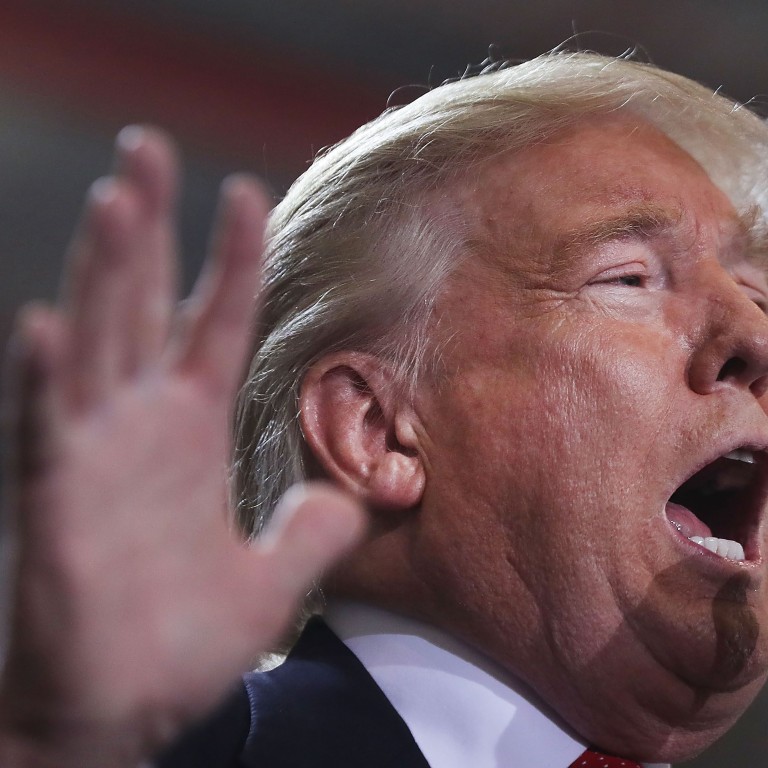
Why Donald Trump’s wall will be around China, not Mexico
If there was any doubt Donald Trump would build a wall if elected, it was put to rest at the start of the first US presidential debate this week. Not a Mexican border wall though, but a Chinese one.
If there was any doubt Donald Trump would build a wall if elected, it was put to rest at the start of the first US presidential debate this week. Not a Mexican border wall though, but a Chinese one.
Seven seconds into Trump’s opening remarks and he was already ripping into China. “Our jobs are fleeing the country…If you look at what China is doing [to the US] in terms of making our product, they’re devaluing their currency and there’s nobody in our government to fight them,” The Donald roared.
Even though Trump has spent more time bashing Mexicans and Muslims than talking about the China “threat” on the campaign trail, he’s made it clear that he intends to raise tariffs on Chinese exports and punish Beijing for being “the world’s greatest” currency manipulator. That means a tariff wall – and it may dwarf the one he wants to build along the US-Mexican border.
Trump even invoked the Great Wall of China to justify the feasibility of his Mexican wall – pointing out that the Chinese version was seven times longer and that the ancient Chinese didn’t have the benefit of modern construction equipment. Critics quickly pointed out that it took centuries to build the Great Wall, and that it wasn’t that effective in stopping northern invaders.

Both sides ignore the biggest problem with the comparison: ancient wall builders didn’t have to worry about modern issues like land ownership – two-thirds of the land along the US-Mexican border is privately or state-owned – or pesky details like environmental impact studies. So there won’t be a Great Wall of Trump – certainly not in Trump’s first term and probably never in a physical form given the alternatives that technological border protection could provide.
So how are the Trump supporters who chanted “build the wall” at his rallies going to feel about that? A President Trump may not care, but he will need a distraction to deflect the heat. In extreme cases national leaders have gone to war to distract the public from domestic problems: remember Margaret Thatcher and the Falkland Islands? To placate his “build the wall” crowd, Trump may have to double down on building tariff walls around Mexico and China. In other words, start a trade war.
Trump has at various times called for tariffs ranging from 25 per cent to 45 per cent on Chinese imports. Daiwa Asia chief economist Kevin Lai ran the numbers and found that a 45 per cent tariff applied across the board would slash China’s economic growth from above 6 per cent to 4.8 per cent.
A new study by the Peterson Institute for International Economics looked at the impact on the US economy, and found that a “full trade war” scenario would push the American economy into negative growth by 2019, the unemployment rate would soar to 8.4 per cent and 4 million private sector jobs would be lost.
US law does give the president power to unilaterally invoke tariffs in cases of economic emergency – and Trump’s election rhetoric certainly paints it that way. Whether Trump would risk such massive economic disruption and slap tariffs on everything coming out of China is unlikely.

When Japanese microchips flooded world markets in the late 1980s, Ronald Reagan slapped a 100 per cent tariff on Japanese semiconductors, high-end computers and TVs. The Bush administration did a similar thing in 2002 to protect the US steel industry. The WTO later ruled against the tariffs but the move bought the US industry a few years of protection.
In an economic policy speech to the New York Economic Club this month, Trump reiterated his intention to punish China for currency manipulation. “We are going to apply tariffs to any country that manipulates its currency to gain advantage over the US,” Trump told a room full of businessmen. He also said countervailing duties will be applied to Chinese imports unless Beijing stops intellectual property theft, and that he will further instruct the US Trade Representative to bring trade cases against China for any WTO violations. Of course, retaliation from China will follow.
China bashing is a theme of every US presidential election, and this one has been no different. While Clinton may have slowed Trump’s momentum in the first debate, a Trump win is not out of the question despite an electoral map that still favours the Democrats.
Most economists agree that trade wars raise consumer prices. A study published in May by the National Foundation for American Policy estimated that if Trump’s tariffs were applied to China, Mexico and Japan, it would cost the typical American household US$11,000 over five years.
Trump supporters may forgive him for not building the Mexican wall, but will they forgive him for making them pay for his China Wall?

